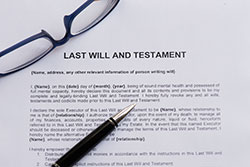|
|
Trusts & Estate Planning
Monday, April 18, 2016

In this computer age, when so many tasks are accomplished via the internet -- including banking, shopping, and important business communications -- it may seem logical to turn to the internet when creating a legal document such as a will . Certainly, there are several websites advertising how easy and inexpensive it is to do this. Nonetheless, most of us know that, while the internet can be a wonderful tool, it also contains a tremendous amount of erroneous, misleading, and even dangerous information.
In most cases, as with so many do-it-yourself projects, creating a will most often ends up being a more efficient, less expensive process if you engage the services of a qualified attorney. Just as most of us are not equipped to do our own plumbing repairs or automotive repairs, most of us do not have the background or experience to create our own legal documents, even with the help of written directions.
Situations that Require an Attorney for Will Creation
In certain cases, the need for an estate planning attorney is inarguable. These include situations in which:
- Your estate is large enough to make estate planning guidance necessary
- You want to disinherit your legal spouse
- You have concerns that someone may contest your will
- You worry that someone will claim your mind wasn't sound at the signing
Mistakes and Omissions
It has always been possible to write a will all by yourself, even before the advent of the typewriter, let alone the computer. Such a document, however, is unlikely to deal with the complexities of modern life. Many estate planning attorneys have seen, and often been asked to repair, wills that have mistakes or significant omissions. These experts have also become aware of situations in which the survivors of the deceased wind up in court, spending thousands of dollars to contest ambiguously worded or incomplete wills. Without legal guidance from a competent estate planning attorney, creating a "boxtop" will can result in tremendous financial and emotional risk.
Evidence that Online Wills Are Not Foolproof
Evidence that many other complications can arise when an individual creates a will using generalized online directions can be found in the following facts:
- Each state has its own rules (e.g. requiring differing numbers of disinterested party signatures)
- Even uncontested wills can remain in probate if not executed in an exacting fashion
- Estate planning attorneys find legal software programs inadequate
- Even legal websites themselves recommend bringing in an attorney in all but the very simplest cases
- Some legal websites provide inexpensive monthly legal consultations with attorneys to protect their client and themselves
Areas that Frequently Cause Problems
Self-constructed wills often become problematic when the testator:
- Names an executor who has no financial or legal knowledge
- Leaves a bequest to a pet (legally, you must leave the bequest to an appointed caretaker)
- Puts conditions on payouts to an that are difficult, or impossible, to enforce
- Makes unusual end-of-life decisions or puts living will information into the will
- Designates guardians for children, but neglects to name successor guardians
- Neglects to coordinate beneficiary designations where, for example, the will and insurance policy designations contradict one another
- Leaves funeral instructions into the will since the document will most likely not be read until after the funeral has taken place
- Leaves inexact or ambiguous instructions dealing with blended families
- Neglects to mention small items in the will which, though of small financial value, are meaningful to loved ones and may cause contention
In order to ensure that you leave your assets in the hands of those you wish, and to avoid leaving your loved ones with bitter disputes and expensive probate costs, it is always wise to consult with an experienced estate planning attorney when making a will. In this area, as in so many others, it is best, and safest, to make use of those with expertise in the field.
Monday, March 28, 2016

The role of an executor is to effectuate a deceased person’s wishes as declared in a will after he or she has passed on. The executor’s responsibilities include the distribution of assets according to the will, the maintenance of assets until the will is settled, and the paying of estate bills and debts. An old joke says that you should choose an enemy to perform the task because it is such a thankless job, even though the executor may take a percentage of the estate’s assets as a fee. The following issues should be considered when choosing an executor for one's estate.
Competency: The executor of an estate will be going through financial and legal documents and transferring documents from the testator to the beneficiaries. If there are legal proceedings, the executor must make all necessary court appearances. There is no requirement that a testator have any financial or legal training, but familiarity with these areas does avoid the intimidation felt by lay people, and potentially saves money on professional fees.
Trustworthiness: The signature of an executor is equivalent to that of the testator of an estate. The executor has full control over all of an estate’s assets. He or she will be required to go through all of the papers of the deceased to confirm what assets are available to be distributed. The temptation to transfer assets into the executor's own name always exists, particularly when there is a large estate. It is important to choose a person with integrity who will resist this temptation. It makes sense to utilize an individual who is an heir to fill the role to alleviate this concern.
Availability: The work of collecting rents, maintaining property, and paying debts can take more than a few hours a week. Selecting an executor with significant obligations to work or family may cause problems if he or she does not have the time available to devote to the task. If an executor must travel great distances to address issues that arise, there will be more of a time commitment necessary, not to mention greater expenses for the estate.
Family dynamics: Selection of the wrong person to act as executor can create resentment and hostility among an estate’s heirs. A testator should be aware of how family members interact with one another and avoid picking someone who may provoke conflict. Even the perception of impropriety can lead to a lawsuit, which will serve to take money out of the estate’s coffers and delay the legitimate distribution of the estate.
Monday, March 14, 2016

A tax basis is essentially the purchase price of a piece of property. Whenever that property is sold, the seller must pay taxes on the difference between the sale price and the original purchase price. This concept applies to all property, including stocks, bonds, vehicles, mechanical equipment, and real estate. If debts are assumed along with the purchase price, the principal amount of the debt will be included in the basis. The basis can be adjusted downwards when a person deducts depreciation costs on his or her income tax returns, and may be increased for capital investments towards improving the property that are not deducted for income tax purposes. Selling a property that has been held for a long time can carry a serious tax burden because of inflation, particularly when real estate prices have increased.
When an individual receives property as an inheritance, the tax basis is reset to whatever the fair market value is at the time of the transfer of title. This means that the heir would pay significantly less taxes if that property is sold by the beneficiary than if the original owner were to sell it and devise the money to his beneficiaries. Most simple wills provide that all of a testator’s assets are placed into a residual estate to be divided equally among the heirs. This means that an executor must liquidate the assets of the estate and divide the proceeds among the heirs. However, because there is no transfer of title before the property is sold, the heirs are stuck with the grantor’s basis and they lose an opportunity for a sizeable tax break.
A person planning his or her estate may also reset the basis in his or her property by giving it as a gift directly to his or her heirs or by gifting the property to an inter vivos trust. These actions can have their own tax related consequences, or create other unintended problems for the beneficiaries. Only an experienced estate planning attorney can advise you on the most efficient way to pass your assets on to your heirs.
Monday, February 22, 2016
 When a loved one dies, an already difficult experience can be made much more stressful if that loved one held a significant amount of debt. Fortunately, the law addresses how an individual’s debts can be paid after he or she is deceased.
When a person dies, his or her assets are gathered into an estate. Some assets are not included in this process. Assets owned jointly between the deceased and another person pass directly to the other person automatically. If there are liens on the property at that time, they will stay on the property, but no new liens can be placed on the property for debts in the name of the deceased. Similarly, debt jointly in the name of the deceased and another party may continue to be collected from the other party. In community property states, all assets and debts are the joint property of both spouses and pass automatically from one to the other. The community property states are Alaska, Arizona, California, Idaho, Louisiana, Nevada, New Mexico, Texas, Washington, and Wisconsin.
From the pool of assets in the estate, an executor is required to pay all just debts. This means that, before a beneficiary may receive anything, all debts must be satisfied. Property might be sold to create liquidity in order to accomplish this. If there are more debts than there are assets, the estate must sell of as many assets as possible to pay off the creditors. If there is no money in the estate, the creditor can not collect anything. Rather than force people into this tiresome process, many creditors will agree to discharge a debt upon receipt of a copy of a death certificate or obituary. This is particularly true of small, unsecured debts. Life insurance proceeds were never owned by the decedent and should pass to a beneficiary without consequence to the estate. Proceeds of a retirement account may also be exempt from debts.
If creditors continue harassing the beneficiaries of debtors, they may be violating federal regulations under the FDCPA. They can be held accountable by their actions, either by the FTC, the state attorney general, or a private consumer law attorney.
Tuesday, February 9, 2016

The law allows a person preparing a will to have almost complete control over his or her assets after the testator passes on, but there are limits to such power. A person can restrict a property from being sold, or make sure that it is used for a specific purpose. A property can be bequeathed to a family member as long on condition that the person maintains the family business in a specific city, or exercises daily, or places flowers on the deceased's grave every week, or engages in any other behavior the testator desires. This freedom, however, is not without limits. The time limit on this ability is called the rule against perpetuities. The rule is also referred to as the “dead man’s hand” statute.
The rule against perpetuities is complex and rarely utilized. At the time of the passing of the testator, the heirs of the estate are locked in. These heirs are referred to as “lives in being.” For the purposes of this rule, if a child is conceived but not yet born at the time of the testator’s death, it will be considered a life in being. Once the last living heir named in the will passes away, the restrictions on the property will continue in place as the testator desired for 21 years. The idea is that a testator may control his assets for a full generation after his or her death. The rule is notoriously difficult to apply properly. When it does apply, the conditions on the bequest are abandoned and the gift returns to the residual estate.
What makes this rule so confusing is that, when an individual writes a will, he or she may make gifts to potential children or grandchildren. These children and grandchildren, however, may not be born until years later. If a child has been born at the time the decedent passes away, he or she is subject to the restrictions on the bequest during his or her lifetime. If a grandchild is conceived and born after the decedent’s death, however, the child may avoid the restrictions 21 years after the death of the last heir alive at the time of the decedent’s death. There is no way to predict when this might occur. The rule is archaic and easily avoided. A knowledgeable attorney can help a person planning his or her estate set up an equitable trust. Similar to a will, a trust may impose conditions on the use of assets, but is not subject to the rule against perpetuities. There are other advantages to a trust, but one of the most important is avoiding this unpredictable and confusing rule.
Monday, January 18, 2016

There are certain considerations that should be kept in mind for those with chronic illnesses. Before addressing this issue, there should be some clarification as to the definition of "chronically ill." There are at least two definitions of chronically ill. The first is likely the most common meaning, which is an illness that a person may live with for many years. Diseases such as diabetes, cardiovascular disease, lupus, multiple sclerosis, hepatitis C and asthma are some of the more familiar chronic illnesses. Contrast that with a legal definition of chronic illness which usually means that the person is unable to perform at least two activities of daily living such as eating, toileting, transferring, bathing and dressing, or requires considerable supervision to protect from crisis relating to health and safety due to severe impairment concerning mind, or having a level of disability similar to that determined by the Social Security Administration for disability benefits. Having said all of that, the estate planning such a person may undertake will likely be similar to that of a healthy person, but there will likely be a higher sense of urgency and it will be much more "real" and less "hypothetical."
Most healthy individuals view the estate planning they establish as not having any applicability for years, perhaps even decades. Whereas a chronically ill person more acutely appreciates that the planning he or she does will have real consequences in his or her life and the life of loved ones. Some of the most important planning will center around who the person appoints as his or her health care decision maker and also who is appointed to handle financial affairs. a will and/or revocable living trust will play a central role in the person's planning as well. Care should also be taken to address possible Medicaid planning benefits. A consultation with an estate planning and elder law attorney is critical to ensuring all necessary planning steps are contemplated and eventually implemented.
Monday, January 11, 2016
 Will - a written document specifying a person’s wishes concerning his or her property distribution upon his or her death. Will - a written document specifying a person’s wishes concerning his or her property distribution upon his or her death.
In order to be enforced by a court of law, a will must be signed in accordance with the applicable wills act.
Testator/Testatrix - the person who signs the will.
Heirs - beneficiaries of an estate.
Executor/Executrix - the individual given authority by the testator to make decisions to put the testator’s written directions into effect.
Once the will is entered into probate, the executor’s signature is equivalent to the testator’s. The executor has a legal duty to the heirs of the estate to act in the best interest of the estate, and may collect a fee for performing such service.
Administrator/Administratrix - the person who assumes the role of the executor when a person dies without a will (intestate).
The Administrator must apply with the local probate office and may be required to provide a bond to be held in escrow as collateral for control over the assets of the estate.
Codicil - an amendment to a will.
In order to be valid, a codicil must comply with all the requirements of the applicable wills act.
Holographic Will- a handwritten will.
Holographic wills are often exempt from requirements of the applicable wills act.
Bequest - a gift given by the testator to his or her heirs through a will.
Residual Estate - the balance of a testator’s belongings after debts have been paid and specific bequests have been distributed.
Intestate - not having signed a will before one dies; a person who dies without having signed a will.
Life Estate - a bequest that gives an heir the right to have exclusive use of a property for the remainder of his or her life, but without the power to transfer such property upon the death of that heir.
The property will transfer to the heirs of the residual estate after the death of the beneficiary of the life estate.
Per stirpes - a Latin phrase precisely translated as “by the branch” meaning that, if an heir named in the will dies before the testator, that heir’s share will be divided equally among that beneficiary’s own heirs.
An alternative to per capita, described below.
Per capita - a Latin phrase precisely translated as “by the head” meaning that, if an heir named in the will dies before the testator, that heir’s share will be divided among the testator’s remaining heirs.
An alternative to per stirpes, described above.
While it is a good idea to have a basic understanding of fundamental estate planning vocabulary, this cannot serve as a substitute for the services of an experienced attorney.
Monday, January 4, 2016

There are many reasons why a person might leave a spouse or another loved one out of his or her will. It is possible that the will in question was executed prior to a marriage and was never properly updated. It may also be the case that the husband and wife, though still technically married, are estranged, and do not contribute to one another’s support. An end of life revelation of a past infidelity may anger a spouse enough to rewrite his or her last will and testament. Individuals may make rash decisions to disinherit spouses based on a single argument or misunderstanding. This can be exacerbated by symptoms of dementia. Regardless of the reason, a person who is not named in his or her spouse’s will may petition the court for the spousal share to receive a portion of the estate.
The spousal share of an estate, also called an elective share, is a holdover from the concept of dower in English common law. Traditionally, dower is a portion of a man’s estate guaranteed to a wife when she is widowed to ensure that she does not fall into poverty after her husband dies. The practice continues today without the same restrictions on gender. Every state in America has a provision in its laws to protect an individual whose spouse dies from being left with nothing. Similar provisions for children also exist in some states. Attempts have been made to introduce legislation to protect unmarried romantic partners the same way as married couples, but these attempts have had little success.
The structure of these protections vary from state to state. The value of the estate for the purposes of establishing the spousal share may include the widow’s assets depending on the jurisdiction. Some states provide a widowed spouse a larger share of the deceased’s estate than others, but almost every state prohibits an individual from disinheriting a spouse entirely. The one state that does not permit an elective share to the spouse in a probate case requires that an estate pay a disinherited spouse financial support for up to one year after the death.
Monday, December 28, 2015

Most people develop an estate plan as a way to transfer wealth, property and their legacies on to loved ones upon their passing. This transfer, however, isn’t always as seamless as one may assume, even with all of the correct documents in place. What happens if your eldest son doesn’t want the family vacation home that you’ve gifted to him? Or your daughter decides that the classic car that was left to her isn’t worth the headache?
When a beneficiary rejects a bequest it is technically, or legally, referred to as a "disclaimer." This is the legal equivalent of simply saying "I don't want it." The person who rejects the bequest cannot direct where the bequest goes. Legally, it will pass as if the named beneficiary died before you. Thus, who it passes to depends upon what your estate planning documents, such as a will, trust, or beneficiary form, say will happen if the primary named beneficiary is not living.
Now you may be thinking why on earth would someone reject a generous sum of money or piece of real estate? There could be several reasons why a beneficiary might not want to accept such a bequest. Perhaps the beneficiary has a large and valuable estate of their own and they do not need the money. By rejecting or disclaiming the bequest it will not increase the size of their estate and thus, it may lessen the estate taxes due upon their later death.
Another reason may be that the beneficiary would prefer that the asset that was bequeathed pass to the next named beneficiary. Perhaps that is their own child and they decide they do not really need the asset but their child could make better use of it. Another possible reason might be that the asset needs a lot of upkeep or maintenance, as with a vacation home or classic car, and the person may decide taking on that responsibility is simply not something they want to do. By rejecting or disclaiming the asset, the named beneficiary will not inherit the "headache" of caring for, and being liable for, the property.
To avoid this scenario, you might consider sitting down with each one of your beneficiaries and discussing what you have in mind. This gives your loved ones the chance to voice their concerns and allows you to plan your gifts accordingly.
Monday, December 21, 2015

There are several reasons that a will may prove invalid. It is important for testators to be aware of these pitfalls in order to avoid them.
Improper Execution
The requirements vary from state to state, but most states require a valid will to be witnessed by two people not named in the will. Some jurisdictions require the document to be notarized as well. Although these restrictions may be relaxed if the will is holographic (handwritten), it is best to satisfy these requirements to ensure that the testamentary document will be honored by the probate court.
Lack of Testamentary Capacity
Anyone over the age of 18 is presumed to understand what a will is. At the end of life, individuals are often not in the best state of mind. If court finds that an individual is suffering from dementia, is under the influence of drugs or alcohol, or is incapable of understanding the document being executed for some other reason, the court may invalidate the will on the grounds that the individual does not have testamentary capacity.
Replacement by a Later Will
Whenever an individual writes a new will, it invalidates all wills made previously. This means that a will might be believed to be valid for months until a more recently executed document surfaces. The newest will always takes precedence, controlling how assets should be distributed.
Lack of Required Content
Every will is required to contain certain provisions to carry out its purpose. These provisions, ensure that the testator understands the reason for executing the document. Although these provisions vary from state to state, some are common to all jurisdictions. It should be clear that the document is intended to be a will. The document should demonstrate an individual’s wishes in regard to what should happen to his or her property after death. A proper will should also include a provision to appoint an executor to act as an agent for the estate and enforce the terms of the will. If the document lacks any of these provisions, the will may be declared invalid.
Undue influence or fraud
A will that was executed under undue influence, coercion or fraud will be invalidated by a court. If a will has been presented to a testator for a signature as if it were any other document, like a power of attorney or a business contract, the court will find that the will was fraudulently obtained and will not honor it. If an individual providing end of life care with exclusive access to the testator threatens to stop care unless a will is modified, that modification is considered to be the result of undue influence and the court will not accept it.
Monday, December 7, 2015

How can I control my assets after death?
The practice of estate planning is dedicated to preserving an individual’s control over his or her assets after death. A simple will can control which individuals receive what assets, but a more thorough plan has the potential to do much more. Establishing a trust is the most common method used to exercise this kind of control.
A trust can issue a bequest restricted by a condition; for example, a trust might be established to pay out $10,000.00 to a specific grandchild only once he or she has reached 18 years of age. Multiple payments can be made to the beneficiaries as long as the trust is funded. The trust can stipulate that the grandchild may have to graduate from college to receive the money, or even that he or she must graduate from a specific school with a minimum grade-point average or membership in a particular fraternity or sorority.
A trust can make the condition of payment as specific or as broad as the creator of the trust wishes. It may, for instance, bequeath benefits to a humanitarian organization on condition that the organization continues to provide food and shelter to the homeless. There is no limit to the number of conditions permissible in a trust document. Even when the conditions go against public policy and general norms and mores established by society, as long as the conditions may be met legally, they will be upheld by the court.
In order to create a trust, there must be a capital investment to fund it and a trustee must be named. The trustee is responsible for protecting the assets of the trust, investing them to the best of his or her ability, managing real estate and other long-term assets, interpreting the trust document, communicating regularly with the beneficiaries of the trust and performing all of these actions with a high level of integrity. Trust assets may be used to pay for expenses of managing the trust as well as to provide a stipend for the trustee if so provided for in the trust document.
If a trust document is not well written, it may be the target of a lawsuit seeking to dissolve the trust and disburse the assets held therein. Even if the trust is defended successfully, the costs of this challenge may deplete its coffers and frustrate the very reason for its creation. In order to avoid these possible pitfalls, it is imperative that a trust document be drafted by an attorney with a high degree of experience in estate planning law.
|
|
|
|